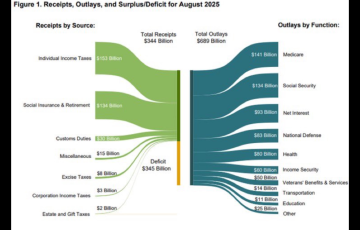
Welcome to The Protocol, CoinDesk’s weekly wrap-up of the most important stories in cryptocurrency tech development. I’m Margaux Nijkerk, the Ethereum protocol reporter on CoinDesk’s Tech team.
In this issue:
- Ethereum Activates ‘Pectra’ Upgrade, Raising Max Stake to 2,048 ETH
- Bitcoin Developers Plan OP_RETURN Limit Removal in Next Release
- Sam Altman’s World Crypto Project Launches in US With Eye-Scanning Orbs in 6 Cities
- Aztec’s Privacy Rollup Hits Testnet Amid Growing Demand
Network News
PECTRA FINALLY GOES LIVE ON ETHEREUM: Ethereum activated its long-awaited “Pectra” upgrade on Wednesday, marking the blockchain’s most significant overhaul since the Merge in 2022. The update aims to streamline staking, enhance wallet functionality, and improve overall efficiency. It arrives as Ethereum contends with rising competition and internal debates over its direction. A key element of the upgrade involves increasing the amount of ETH one can stake from 32 to 2,048. This change could help speed up and streamline operations for stakers, the vast network of companies and individuals who help keep the Ethereum network afloat. Previously, staking at scale required setting up multiple validators; now, stakers can consolidate up to that amount under a single node. — Margaux Nijkerk Read more.
BITCOIN CORE DEVS TO REMOVE OP_RETURN LIMIT, SPARKING DEBATE: The debate over Bitcoin’s OP_RETURN heats up, as developers of Bitcoin Core – the most popular node software – said they plan to scrap OP_RETURN entirely in the next release. The OP_RETURN limit is an 80-byte cap on the amount of arbitrary data that can be embedded in a Bitcoin transaction using a special, unspendable output field. The debate centered on whether lifting the 80-byte OP_RETURN limit promotes transparency and simplifies data use on Bitcoin, or whether it opens the door to abuse, spam, and a shift away from Bitcoin’s financial focus. — Sam Reynolds Read more.
WORLDCOIN COMES TO 6 U.S. CITIES: Sam Altman’s blockchain project, World, is launching in the U.S. – and said it intends to roll out 7,500 eye-scanning “orbs” in cities across the country by the end of the year. World’s orbs — chrome, bowling ball-shaped devices that scan a person’s eyeballs to confirm their identity — will initially be available to Americans in six “key innovation hubs,” the company said: Atlanta, Austin, Los Angeles, Miami, Nashville and San Francisco. Those who decide to take the plunge and gaze into the orb will gain access to the World app and receive an airdrop of World’s WLD token. By the end of the year, the project aims to have enough orbs spread throughout the U.S. to give 180 million Americans, more than half the population, access to World’s network.— Cheyenne Ligon and Margaux Nijkerk Read more.
AFTER 8 YEARS, AZTEC TESTNET IS LIVE: Aztec, a layer-2 rollup focused on privacy, shared that its testnet has finally gone live. The announcement comes as a wave of new privacy-focused solutions begins to capture the interests of large institutions that need confidentiality with large transaction batches. The team behind Aztec said that they have been working on the product for over 8 years, bringing the cutting-edge technology one step closer to the mainnet. — Margaux Nijkerk Read more.
In Other News
- Movement Labs, the development firm of the Movement network, has rebranded to “Movement Industries” and cut ties with co-founder Rushi Manche following controversy surrounding undisclosed MOVE token deals. The announcement came via the company’s X account early Tuesday, stating that “Movement Labs has terminated Rushi Manche’s employment and all affiliations with the company effective immediately.” The decision follows a CoinDesk report that first revealed secret agreements between Movement-linked entities and market makers during the project’s token launch. — Shaurya Malwa Read more.
- The price of gold has surged almost 29% this year, solidly beating the 3.8% gain in bitcoin (BTC). Even so, that’s failed to deter investors eager to add the largest cryptocurrency to their portfolios. BlackRock’s spot bitcoin ETF (IBIT) has attracted a net $6.96 billion in inflows since the start of the year, the sixth-largest amount of all exchange-traded funds, according to data from Bloomberg’s senior ETF analyst, Eric Balchunas. SPDR Gold Trust (GLD), the world’s largest physically backed gold ETF, slipped to the number seven position Monday with net inflows of $6.5 billion. IBIT’s outperformance indicates institutions’ persistent confidence in bitcoin’s long-term prospects despite the relatively dour price performance. — Omkar Godbole Read more.
Regulatory and Policy
- Democrats in the U.S. House of Representatives derailed what was supposed to be a joint hearing on crypto policy efforts on Tuesday, insisting that President Donald Trump’s personal crypto dealings were too urgent to allow other discussion on instituting industry regulations. — Jesse Hamilton Read more.
- New Hampshire has become the first state to allow the investment of its public funds into crypto assets with its governor signing the new law on Tuesday. The state beat a number of others to the punch this year as what had started as a surge in state lawmaker momentum had run into roadblocks over recent weeks. As the first to authorize its treasurer to set up such a reserve, New Hampshire could very well beat the U.S. government in forming a stockpile, too. — Jesse Hamilton Read more.
Calendar
- May 14-16: Consensus, Toronto
- May 19-23: Solana Accelerate, New York City
- May 20-22: Avalanche Summit, London
- May 27-29: Bitcoin 2025, Las Vegas
- May 27-29: ETHPrague, Prague
- June 8-22: Berlin Blockchain Week, Berlin
- June 30-July 3: EthCC, Cannes
- Sept. 22-28: Korea Blockchain Week, Seoul
- Oct. 1-2: Token2049, Singapore
- Dec. 11-13: Solana Breakpoint, Abu Dhabi


